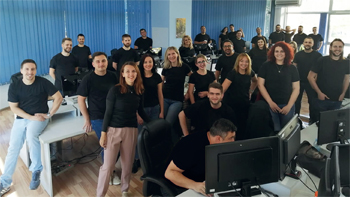
Many newspaper and magazine publishers are working with content management systems (CMS) and publishing platforms that require their journalists to jump through hoops just to get their content published.
There are, broadly speaking, says Richard Fairbairn, MD of Glide Publishing Platform, three types of CMS in use by publishers: firstly, the DIY model, often based on open-source technology like Drupal or WordPress; secondly, generic cross-industry CMS, and thirdly, publishing-specific systems built by publishers themselves.
The problem with the first is that they force publishers to become CMS developers – basically a technology company – rather than focus on content. Most publishers cannot afford this approach and, Glide says, they shouldn’t have to. The problem with the second is that an awful lot of the functionality publishers require is not available out-of-the-box, so needs to be built, which is expensive and, again, requires publishers to become CMS developers.
The third type of CMS, one designed specifically for publishers, is what Glide provides, with the crucial difference being, says Richard, that it is a fully-featured product, not an in-house one-off. “I know it sounds corny, but our platform is by publishers for publishers,” he says.
Glide is a publishing platform, with a London-based management, marketing and operations team, backed up by a Bosnia-based team of product and development staff.

The senior team includes former journalists. Richard himself has worked as a journalist and editor across newspapers and magazines. His first byline was for the Watford Observer; he has also worked as a journalist at the Sunday Times, managing editor at EMAP for Motorcycle News and editor at Loop and P1 Digital Media. He has been closely involved in CMS, as a user, for over 20 years and his experience includes large new installations and platform migration work. In short, he says, “We know what editorial staff want, and that has been plumbed into Glide Publishing Platform.”
The Glide platform, which has been five years in the making, is now being used by publishers like Daily Mail, Which? and soon Racing Post, all which have different revenue models: “Our focus, up until now, has been on developing the product and embedding it in with our first customers. That was our ‘stealth phase’ and we’re now ready to get our message out there, to tell the rest of the industry about our exciting new publishing platform.”

Hence our meeting on a cloudy February day at their fifth floor Islington offices, with its lovely panoramic view over London.
I started by pointing out that every publisher will have some form of CMS, however rudimentary. If they’re in business, then, self-evidently, the system works. Doesn’t it? Why would they change?
“For many publishers, digital publishing is a slog. Their systems are an impediment not an enabler. With a platform like Glide, they will publish content much more quickly, and because it takes less time, the quality of the output rises. You will be publishing faster and better; you will be more productive and be making more money.”
Inefficient publishing has become commonplace, so it’s quite possible for publishers to be unaware of the predicament they’re in. There are, says Richard, some obvious tell-tale signs that all is not well:
1. Your editorial team is permanently grumpy
“Publishers are in the content business, so if the people who create your content are not happy, then the business will suffer. Journalists need systems and processes that enable and facilitate the quick and easy publishing of content. If they are being asked to work around system inefficiencies, to think like CMS developers, and to do things in counter-intuitive ways, remembering things they shouldn’t be asked to remember, then they will pack up and leave. The warning signs include an increasing litany of angry emails and fraught editorial meetings spent talking about systems and not content.”
2. Your editorial team does not represent good RoI
“Have you ever sat down with your journalists and watched what they do? It can be very instructive. When we were developing Glide, that is what we did. For one client, we noted that it was taking 40 minutes to upload each story, and that didn’t include the time spent writing it. The journalist was constantly having to exit the CMS to do production related work elsewhere – eg. producing multiple crops of the same picture, manually sourcing video ids or finding URLs of related content etc etc. On the Glide platform, typically, it would take them under 15 minutes; everything is done from within the platform; picture crops are automated, as are related content links and SEO tagging. They can be overridden, but the default settings will enforce the business rules and provide the right information as standard best practice.”
“Slashing turnaround times in this way means journalists can produce much more content, and improve immensely the quality. And because the tedious production processes are removed, journalists can focus on producing much better content. The result is a much improved return on your editorial investment, and happier teams.”
3. Your developers are not spending enough time on UX
“A publisher’s own development team should be spending time on revenue generating areas such as improving the user experience, fine tuning user journeys, launching new products and not, as is often the case, on CMS related issues. You wouldn't build your own CRM, so why would you build your own publishing platform? Why take your developers away from your business to become CMS developers? Because of ageing CMS systems, which have been adapted over many years and have evolved into a bit of a Frankenstein’s monster, you are having to employ expensive developers simply to maintain it. By using a SaaS platform like Glide, all those maintenance and development issues are taken care of by us, leaving your developers free to focus on more productive areas.”
4. You’re not launching new stuff
“In the pre-digital age, it was said that launches were the lifeblood of the industry, but publishers are launching less and less. Amongst the reasons are that major new projects are perceived as too difficult because existing publishing platforms are not flexible enough and will need extensive and expensive redevelopment to get the idea off the ground. Furthermore, editorial teams are overstretched, so are not coming up with the ideas and valuable archived content, which could form the basis of many a new product, is structured in such a way as to make it inaccessible. Often it has to be rekeyed. All of which form a big drag on new product development.”
5. You spend too much time worrying about technology
“A publisher’s skill is in creating excellent content for their community. So, creativity and the market are what they should be obsessing about, not spending unproductive hours trying to second-guess the next tech trend and how it might impact them. Publishers’ attention should be on honing their own products, not on trying to keep abreast of every possible new technology and work out if it’s of use or not – we do that for them.”
6. Your website is stuck in a rut
“Does your website look pretty much like it did two years ago? If some seismic event happened tomorrow, would your website reflect the enormity of what had just happened or would it be just another day, with the bombshell lead taking up no more page real estate than the weather report you ran yesterday? Due to inflexible publishing platforms, editors are hamstrung. There is no digital equivalent, in their world, of clearing the front page to handle a major news event, like 9/11 or the death of Princess Diana. Not only does this rigidity stifle editors’ creativity, it also stops them experimenting with new layouts, because it’s all just too difficult…”
7. Your heart sinks when you hear about a new social channel
“Perhaps the acid test of whether your CMS is the right one for you, is your state of mind when you hear about a new publishing channel, say a new social media platform, or the rise of voice activated assistants. Do you recoil? Does your mind immediately fill with thoughts of all the production hurdles you will need to overcome? Or, is your attitude one of great excitement and impatience to get back into the office to talk to the team to see what you can do to quickly take advantage of this new route to market?
“For many publishers, it’s the former, and they are the ones we want to be talking to.”
“Frictionless production and distribution of content is at the very heart of what we do. We provide the tools and processes that will make content plays a success, and provide that perfect bridge between the technology and product teams building experiences and the editorial teams who are creating content, suited to the needs of the environments publishers work in.”
Importantly, Glide is not an all or nothing offering. It consists of a set of API-driven services that do specific tasks: for instance, Glide Deliver is a front-end framework, Glide Publisher is for content creation and Glide Media is for digital asset management. These can be used separately, integrated with your existing system to address a specific need, or can be used together as required.
So, I ask Richard, what type of publishers are you trying to reach? Large or small. “Both!” he says: “Giving scale to publishers is also our goal. In short, whatever is good enough for big publishers is also suitable for small independent ones too. We have built this into our pricing.”
“Our mission is to be the publishing platform of choice for all publishers. Our focus is on giving publishers the tools to publish better and quicker; to remove all constraints on them being where they need to be: to be their tech eyes and ears, allowing them to focus on what they’re best at: creating content and engaging with their communities. If that sounds like the kind of relationship you would like to have with your CMS provider, then give me call. It would be great to chat…”

Glide
408 ScreenWorks, 22 Highbury Grove, London, N5 2ER
Richard Fairbairn, Managing Director
Tel: 020 8133 1696
Email: info@gpp.io
Web: www.gpp.io










